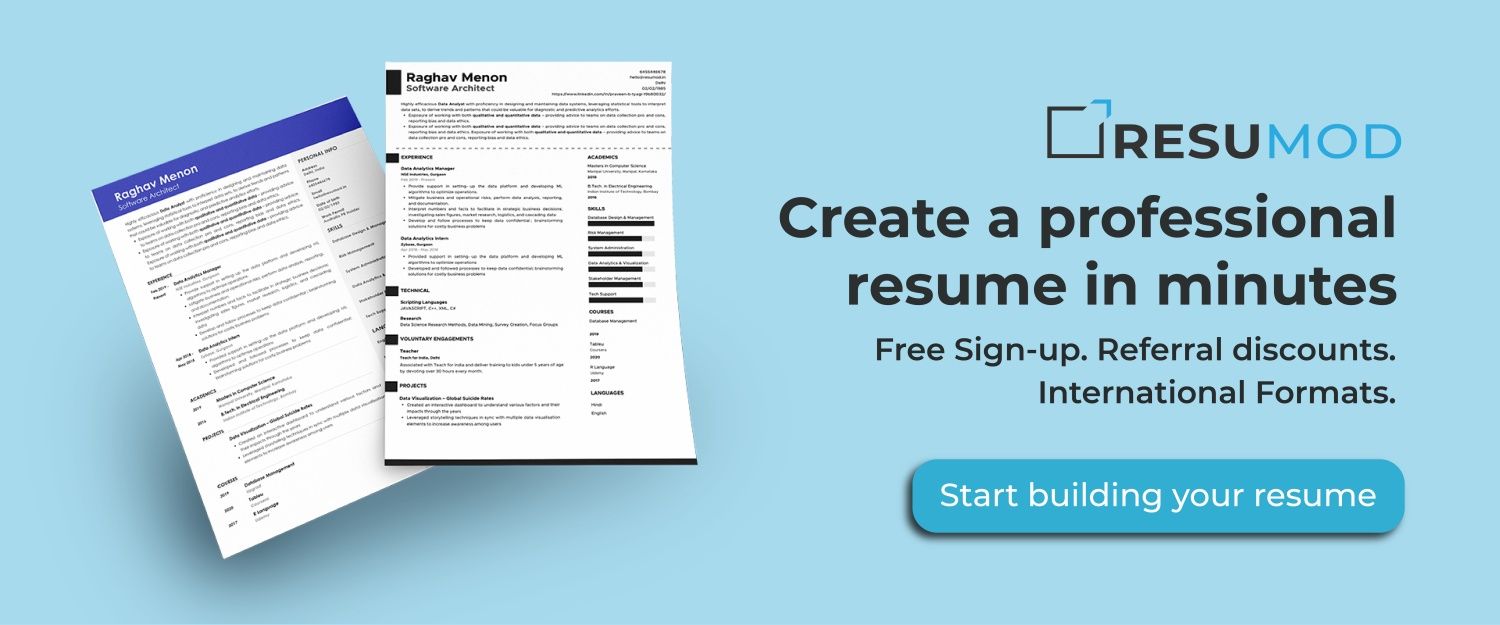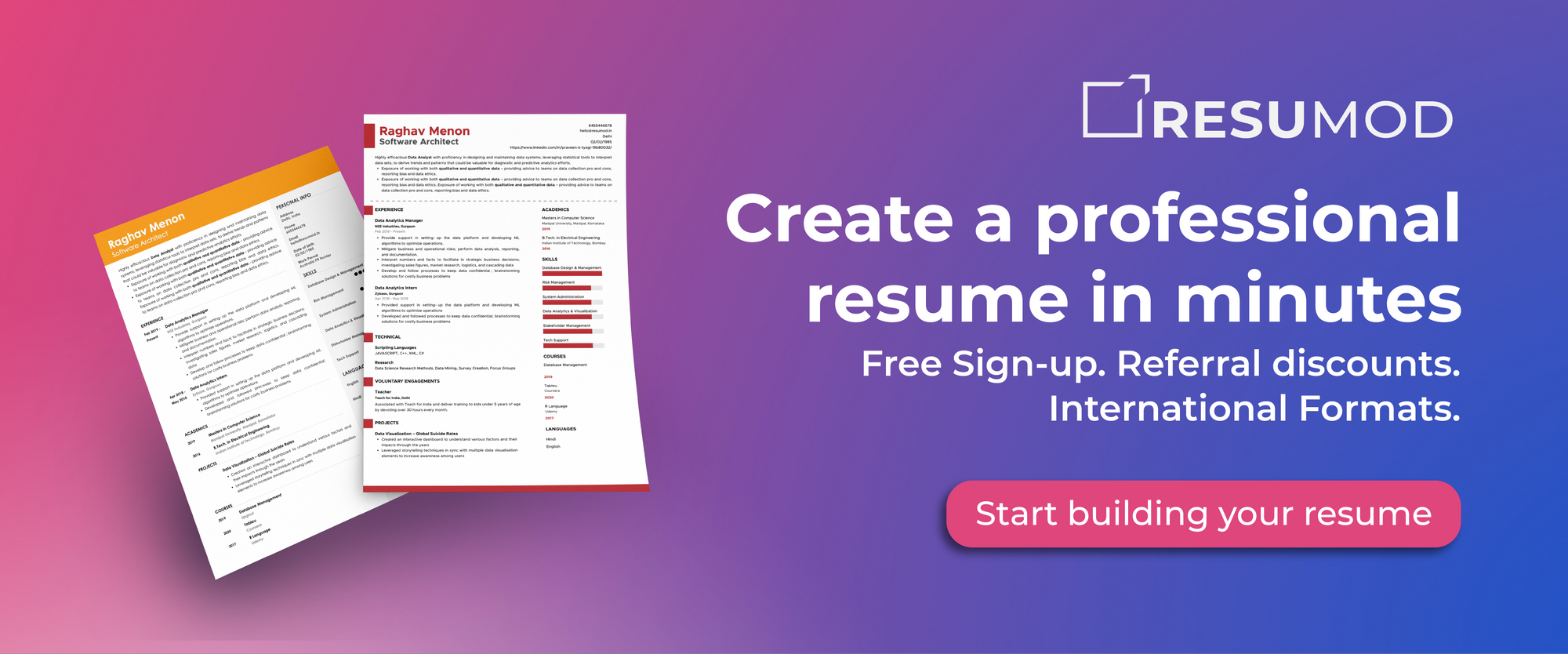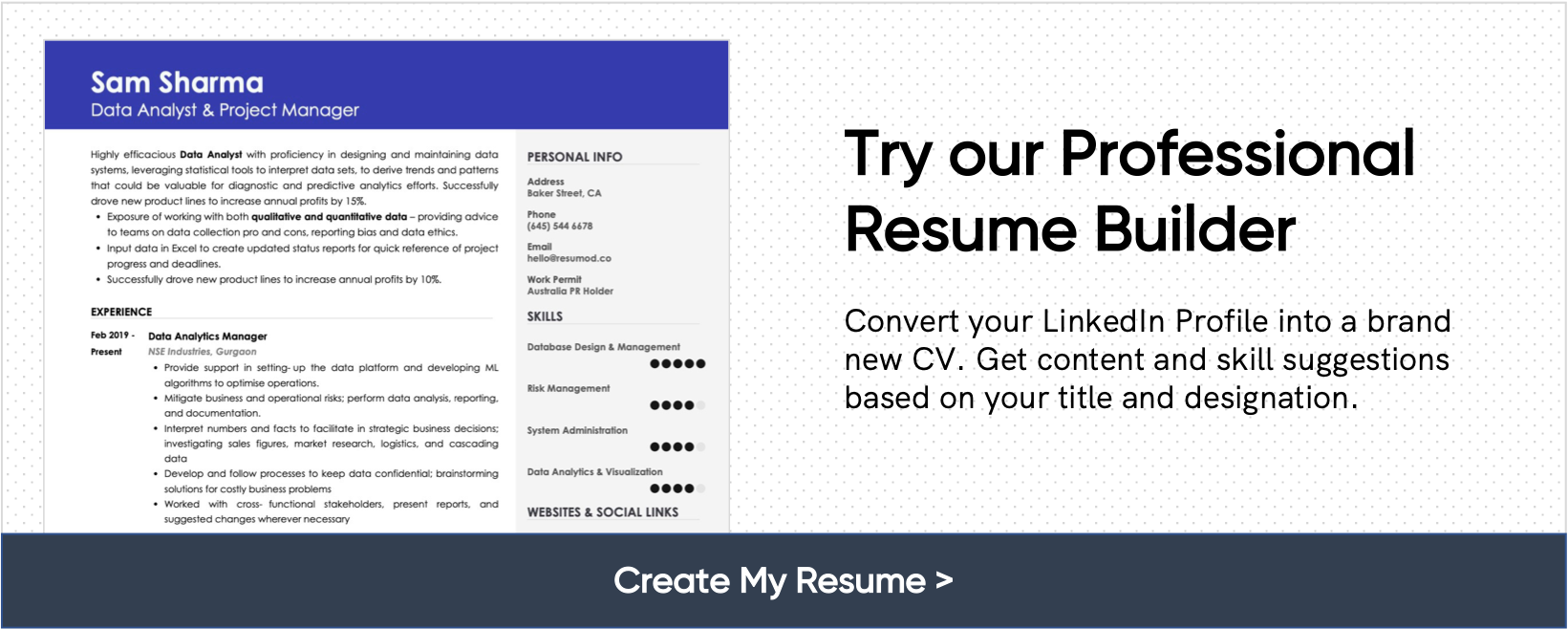Crafting Your Big Data Resume + 5 Big Data Projects to Include
Harnessing the power of Big Data has become a strategic imperative, making careers in this field not only promising but also indispensable.
In the digital age, the sheer volume and complexity of data generated on a daily basis have given rise to the phenomenon known as Big Data. Characterized by the three Vs—volume, velocity, and variety—Big Data presents both challenges and opportunities for organizations across the globe. Harnessing the power of Big Data has become a strategic imperative, making careers in this field not only promising but also indispensable.
In this blog you will learn:
- Understanding Big Data
- Big Data as a promising career option
- Career options and profiles in Big Data
- Anatomy of a standout Big Data resume
- Why Big Data projects matter on your resume?
- Five projects to make your Big Data resume stand out
- Top skills to include in your big data resume
- List of keywords for your Big Data resume
- Top-rated Big Data resumes on Resumod
Understanding Big Data
Big Data refers to the massive sets of structured and unstructured data that organizations collect and process. This data is often too large or complex for traditional data processing applications to handle. The rise of Big Data technologies has enabled businesses to extract valuable insights, make data-driven decisions, and gain a competitive edge in the market.
Big Data as a Promising Career Option
Recently, Big Data has emerged as a promising career option and both the beginner workforce and the senior IT professionals are seen gravitating towards it. Here are a few reasons why:
- Rapid Industry Growth: The demand for skilled professionals in Big Data is soaring, driven by the exponential growth in data generation across industries. Organizations are actively seeking individuals who can unlock the potential of Big Data to drive innovation and strategic decision-making.
- Impact on Decision-Making: Big Data analytics empowers organizations to make informed decisions based on data-driven insights. Professionals in this field play a pivotal role in shaping business strategies, optimizing processes, and enhancing overall efficiency.
- Diverse Applications: Big Data is not limited to a specific industry; its applications span across sectors such as finance, healthcare, e-commerce, marketing, and more. This versatility provides professionals with the opportunity to work in a variety of domains.
- Technological Advancements: The continuous evolution of Big Data technologies, such as Hadoop, Spark, and machine learning frameworks, offers professionals the chance to stay at the forefront of technological innovation. This dynamic environment ensures ongoing learning and skill development.
Career Options and Profiles in Big Data
Though a relatively new career option, Big Data offers multiple roles and profiles. Here's a brief overview
Big Data Engineer
- Role: Design, develop, and manage the architecture of Big Data systems.
- Skills: Proficiency in Hadoop, Spark, SQL, and programming languages like Java or Python.
Data Scientist
- Role: Extract insights from data, build predictive models, and communicate findings to inform business decisions.
- Skills: Statistical analysis, machine learning, programming, and data visualization.
Data Analyst
- Role: Analyze and interpret complex data sets, generate reports, and provide actionable insights.
- Skills: Data analysis tools, SQL, and proficiency in data visualization tools.
Big Data Architect
- Role: Develop and design the overall structure of Big Data solutions to meet business requirements.
- Skills: System architecture, database design, and expertise in Big Data technologies.
Machine Learning Engineer
- Role: Build and deploy machine learning models to solve complex problems.
- Skills: Machine learning algorithms, programming, and expertise in relevant tools and frameworks.
Data Governance Analyst
- Role: Ensure data quality, security, and compliance with regulations.
- Skills: Knowledge of data governance frameworks, data management, and compliance standards.
Anatomy of a Standout Big Data Resume
- Clear and Concise Summary: Provide a brief yet impactful summary at the beginning of your resume, highlighting your key skills, expertise, and career objectives. This section sets the tone for the rest of your document.
- Technical Skills Showcase: Create a dedicated section to list your technical skills relevant to Big Data. Include proficiency in tools and frameworks such as Hadoop, Spark, SQL, Python, and any other technologies specific to your experience.
- Professional Experience: Detail your work experience, emphasizing your achievements and the impact of your contributions. Highlight projects where you applied Big Data technologies to solve real-world challenges.
- Education and Certifications: Mention your educational background and any relevant certifications. Showcase your commitment to staying updated with the latest developments in Big Data technologies.
- Project Portfolio: Devote a section to showcase your Big Data projects. Provide details on the objectives, methodologies, tools used, and outcomes. This section is a crucial differentiator and deserves special attention.
- Tailored Keywords: Customize your resume for each job application by incorporating keywords from the job description. Applicant Tracking Systems (ATS) often scan resumes for specific terms, so aligning your content with the job requirements is essential.
- Quantifiable Achievements: Where possible, quantify your achievements. If you improved processing times, enhanced data accuracy, or contributed to cost savings, use numbers to underscore your impact.
Why Big Data Projects Matter on Your Resume?
As you navigate the competitive landscape of the Big Data job market, the importance of crafting a resume that not only lists your skills but also showcases your hands-on experience cannot be overstated.
Beyond a mere list of technical proficiencies, projects provide a window into your practical application of knowledge, highlighting your problem-solving abilities, technical prowess and collaborative spirit, and setting you apart as a candidate who brings real-world impact to the table. Let's delve into why Big Data projects are the secret sauce that can elevate your resume and open doors to exciting career opportunities.
- Demonstrates Practical Application: Big Data is not just about theoretical knowledge; it's about applying that knowledge to solve real-world problems. Including projects on your resume shows hiring managers that you can translate your skills into tangible outcomes.
- Highlights Problem-Solving Abilities: Big Data professionals are problem solvers. Projects provide a platform to showcase your ability to identify challenges, formulate solutions, and implement them effectively using Big Data technologies.
- Showcases Technical Proficiency: Employers want to know that you can navigate the complex landscape of Big Data tools. Projects allow you to highlight your technical proficiency, whether it's in implementing Hadoop clusters, developing machine learning models, or optimizing data processing pipelines.
- Illustrates Collaboration and Communication: Many Big Data projects involve collaboration with cross-functional teams. Including projects on your resume demonstrates your ability to work collaboratively, communicate effectively, and convey complex technical concepts to non-technical stakeholders.
- Sets You Apart from Competitors: In a competitive job market, a resume with well-documented projects stands out. It provides evidence of your hands-on experience, making you a more attractive candidate to employers seeking professionals who can hit the ground running.
Five Projects to Make Your Big Data Resume Stand Out
Showcasing your skills through practical projects is a powerful way to stand out in the competitive job market. Here are 5 projects for you to include:
#1 Predictive Analytics for Sales Forecasting:
Objective: Develop a predictive analytics model to forecast sales, helping businesses make informed decisions and optimize their resources.
Key Components:
- Data Cleaning and Preprocessing
- Exploratory Data Analysis (EDA)
- Feature Engineering
- Model Selection (Regression, Time Series Analysis)
- Model Evaluation and Fine-Tuning
- Visualization of Results
Benefits: Showcase your proficiency in machine learning and demonstrate how your model contributes to improving business outcomes, such as inventory management and resource allocation.
#2 Customer Segmentation for Marketing Strategies:
Objective: Utilize clustering algorithms to segment customers based on their behaviour, enabling targeted marketing strategies.
Key Components:
- Data Exploration
- Feature Scaling
- Clustering Algorithms (e.g., K-means)
- Interpretation of Clusters
- Recommendation for Marketing Strategies
- Visualization of Customer Segments
Benefits: Highlight your ability to derive actionable insights from data, helping businesses tailor their marketing efforts to specific customer segments and enhance customer engagement.
#3 Sentiment Analysis for Social Media Monitoring:
Objective: Develop a sentiment analysis model to monitor social media sentiments around a brand, product, or service.
Key Components:
- Data Collection from Social Media Platforms
- Text Preprocessing
- Sentiment Analysis Model (Natural Language Processing)
- Visualization of Sentiment Trends
- Real-time Monitoring Dashboard
Benefits: Showcase your natural language processing skills and demonstrate how your model contributes to brand reputation management and customer satisfaction.
#4 Fraud Detection in Financial Transactions
Objective: Build a fraud detection system to identify anomalous patterns in financial transactions, enhancing security measures for financial institutions.
Key Components:
- Data Imbalance Handling
- Feature Selection
- Anomaly Detection Algorithms
- Model Evaluation Metrics (Precision, Recall)
- Real-time Alerting System
- Visualization of Detected Anomalies
Benefits: Demonstrate your expertise in dealing with imbalanced datasets and showcase how your model contributes to safeguarding financial systems.
#5 Healthcare Predictive Modeling for Disease Diagnosis:
Objective: Create a predictive model for early disease diagnosis, using healthcare data to assist medical professionals in decision-making.
Key Components:
- Data anonymization and privacy considerations
- Feature Engineering with Medical Data
- Model Development (Classification)
- Interpretability of Model Predictions
- Collaboration with Healthcare Professionals
- Visualization of Model Performance
Benefits: Highlight your ability to work with sensitive healthcare data, emphasizing the positive impact of your model on early disease detection and patient outcomes.
Top Skills to Include in Your Big Data Resume
Big Data professionals need a unique set of skills that go beyond technical know-how to thrive in a dynamic market. Here are top skills that are essential for success in the fast-paced and evolving world of Big Data.
1. Technical Proficiency:
- Key Technologies: Hadoop, Spark, Apache Flink, Kafka, SQL, NoSQL databases.
- Rationale: Mastering the core technologies in the Big Data ecosystem is foundational. Competency in tools like Hadoop for distributed storage and processing, Spark for large-scale data processing, and Kafka for real-time data streaming is vital.
2. Programming Skills:
- Languages: Python, Java, Scala.
- Rationale: Proficiency in programming languages is crucial for implementing algorithms, developing data pipelines, and creating efficient data processing scripts. Python, Java, and Scala are widely used for Big Data applications.
3. Data Management:
- Skills: Data warehousing, data modeling, data integration.
- Rationale: Effective data management is essential for ensuring data accuracy, consistency, and reliability. Understanding data modeling techniques and principles enhances the ability to design robust data architectures.
4. Machine Learning and Statistical Analysis:
- Skills: Machine learning algorithms, statistical modeling.
- Rationale: Big Data professionals should be adept at applying machine learning algorithms to extract valuable insights. Statistical analysis is crucial for making informed decisions and predictions based on data patterns.
5. Data Security and Privacy:
- Skills: Encryption, access control, compliance.
- Rationale: With the increasing emphasis on data privacy, Big Data professionals must be well-versed in implementing security measures, ensuring data integrity, and adhering to regulatory compliance.
6. Problem-Solving and Critical Thinking:
- Skills: Analytical thinking, troubleshooting, creative problem-solving.
- Rationale: Big Data professionals encounter complex challenges regularly. The ability to think critically, identify problems, and devise innovative solutions is crucial for success in this field.
7. Communication Skills:
- Skills: Data visualization, effective communication of findings.
- Rationale: Translating complex technical insights into understandable information for non-technical stakeholders is vital. Proficiency in data visualization tools enhances the communication of data-driven insights.
8. Adaptability and Continuous Learning:
- Skills: Keeping up with evolving technologies, staying curious.
- Rationale: The Big Data landscape is ever-changing. Professionals must stay adaptable, embrace new technologies, and engage in continuous learning to remain at the forefront of the industry.
9. Team Collaboration:
- Skills: Collaboration, effective teamwork.
- Rationale: Many Big Data projects involve cross-functional teams. The ability to collaborate, communicate, and work effectively with team members from diverse backgrounds is essential.
10. Project Management:
- Skills: Time management, project planning, agile methodologies.
- Rationale: Successfully executing Big Data projects requires effective project management skills. Understanding agile methodologies and efficient time management ensures project success.
List of Keywords for Your Big Data Resume
- Data Structures
- Data Modeling
- Predictive Modeling
- Regression
- Data Visualization
- Predictive Analysis
- Statistical Modeling
- Data Mining
- Clustering & Classification
- Quantitative Analysis
- ML Algorithms
- Web Scraping
- Python
- Java
- Extract, Transform and Load
- Visualisation
- Data Analysis
- Data Processing
- Data Warehousing
- Data Extraction
- Analytical Skills
- Communication Skills
- NoSQL
- Data Analysis
- Data Architecture
- Physical Data Models
- Data Quality
- Data Collection
- Trend Spotting
- Data Profiling
- Statistical Analysis System
- Structured Query Language (SQL)
- Tableau
- Oracle
- Excel
- Big Data
- Business Intelligence
- AutoCAD
- Process Improvement
Top Rated Big Data Resumes on Resumod
Resume of Machine Learning Engineer

Check the full resume of ML Engineer in text format here
Resume of Data Engineer

Check the full resume of Data Engineer in text format here
Resume of Data Modeler

Check the full resume of Data Modeler in text format here
Resume of Data Warehousing Specialist

Check the full resume of data warehousing specialist in text format here
Resume of Data Analyst

Check the full resume of data analyst text format here
Resume of Enterprise Architect

Check the full resume of Enterprise Architect in text format here
Resume of NLP Data Scientist

Conclusion:
Embarking on a career in Big Data offers a dynamic and rewarding journey for those passionate about leveraging data to drive innovation and decision-making. The industry's rapid growth, coupled with the diverse range of career options, makes Big Data an exciting and promising field for professionals seeking to make a meaningful impact in the world of data analytics and technology. As we delve deeper into the nuances of Big Data, the opportunities for growth and development in this field become increasingly apparent, setting the stage for an enriching career path ahead.



